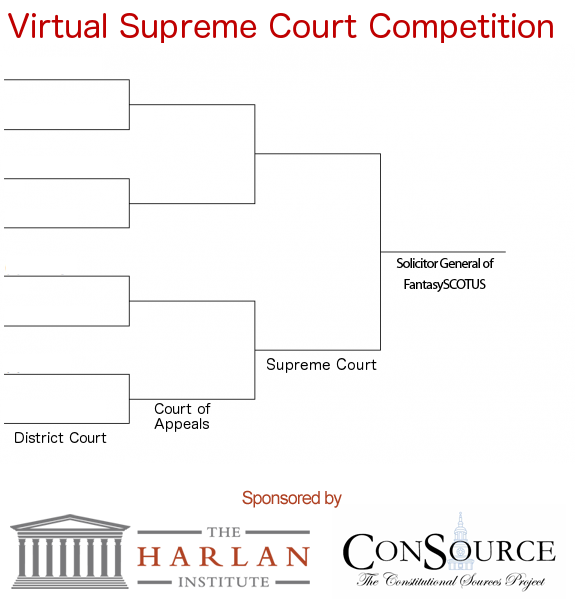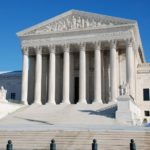In December, the Mayor of Houston decided to extend benefits to city employees who are in same-sex marriages. A suit was filed, claiming that the Mayor’s decision was foreclosed by the Texas Constitution, which prohibits the recognition of same-sex relationships. The Mayor countered that following Windsor, the Texas Constitutional provision was void, and she was free to extend the benefits. The plaintiffs challenged the Mayor in state court, alleging a violation of many provisions of state law. (Taxpayer standing in Texas is much broader than under Article III). A state family judge entered a TRO. The complaint only mentioned, in passing, a provision of state law that requires the Mayor to comply with federal law. On this basis, the City removed the case to federal court. Last week, Judge Lee Rosenthal in the Southern District of Texas remanded the case, finding no federal question.
The motion to remand does not turn on the substantive issue of whether the United States Constitution requires state law to recognize same-sex marriages and grant related benefits. The
issue is instead straight out of a law school federal courts class. The issue is whether this court has federal subject-matter jurisdiction necessary to decide the substantive issue. The complaint filed in state court does not raise a claim under, or refer to, federal law. Instead, the complaint alleges that Mayor Parker’s directive and its implementation violate Section 6.024 of the Texas Family Code; Article II, Section 22 of the Houston City Charter; and Article 1, Section 32 of the Texas Constitution. The defendants argue that removal is proper under 28 U.S.C. § 1441(a) because Section 22 of the Houston City Charter refers to federal law, and because the plaintiffs’ claims necessarily raise a substantial federal question. The plaintiffs deny that the federal law reference in the City Charter is sufficient to establish jurisdiction or that the complaint otherwise necessarily raises federal issues.
The court bases its decision on one of my favorite cases, Mottley!
Whether the defendants’ argument is right is a substantive issue of federal constitutional law. The problem with their argument in the context of the law governing federal jurisdiction is that it raises a federal-law defense to a state-law cause of action. The Supreme Court has consistently held that a federal defense to a state-law claim cannot confer federal jurisdiction, even when that federal defense is clearly anticipated and even when the plaintiffs themselves refer to the defense in their complaint. See Beneficial Nat. Bank v. Anderson, 539 U.S. 1, 6 (2003); Merrell Dow Pharm. Inc. v. Thompson, 478 U.S. 804, 808 (1986); Franchise Tax Bd., 463 U.S. at 12; Louisville & Nashville R.R. Co., 211 U.S. at 152. “Although such allegations show that very likely, in the course of litigation, a question under the Constitution would arise, they do not show that the suit, that is, the plaintiff’s original cause of action, arises under the Constitution.” Louisville & Nashville R.R. Co., 211 U.S. at 152.
The Supreme Court has told federal district courts for over a century that raising a federal defense to a state-court complaint that alleges only state-law claims, even when it is obvious to all that the federal defense will be raised and must be decided, is not enough to give a federal court subject-matter jurisdiction. Instead, any issue of federal law must be “an element, and an essential one, of the plaintiff’s cause of action.” Hoskins v. Bekins Van Lines, 343 F.3d 769, 772 (5th Cir. 2003). “
Even though the complaint references a provision that requires the City to comply with federal law, this by itself is not enough to satisfy Mottley.
The fact that the plaintiffs asserted a claim under Article II, Section 22 of the Houston City Charter, which contains a clause describing the Mayor’s obligation to comply with federal law, does not transform the defense into an element of the plaintiffs’ claims. References to federal law or to the United States Constitution in a plaintiff’s complaint do not, on their own, create federal-question jurisdiction. See, e.g., Walter v. Old Am. Cnty. Mut. Fire Ins. Co., No. Civ. A. H-12-2581, 2012 WL 5818227 (S.D. Tex. Nov. 14, 2012) (“A vague reference to ‘the Constitution’ does not establish
ederal-question jurisdiction.”); Maguire v. Telcom Global Solutions, Inc., No. Civ. A. 3:02-CV- 1728-G, 2003 WL 124475 (N.D. Tex. Jan. 10, 2003) (“‘[M]ere reference to the Federal Constitution, laws or treaties [is] not adequate to disclose a federal question.’ ” (second alteration in original) (quoting Ashley v. Sw. Bell Tel. Co., 410 F. Supp. 1389, 1392 (W.D. Tex. 1976)). A state entity’s explicit or implicit obligation to act consistently with federal law does not grant federal-question jurisdiction or transform the dispute over whether the entity complied with federal law into an element of the plaintiff’s state-law claims. See Gully v. First Nat. Bank, 299 U.S. 109, 115 (1936) (“True, the tax, though assessed through the action of the state, must be consistent with the federal statute consenting, subject to restrictions, that such assessments may be made…. It must also be consistent with the Constitution of the United States…. That there is a federal law permitting such taxation does not change the basis of the suit, which is still the statute of the state”). Although the Houston City Charter refers generally to “federal law,” it is clear that the claim that the Mayor’s directive violates the Houston City Charter does not require the plaintiffs to prove compliance with federal constitutional law as interpreted by the United States Supreme Court to assert a plausible claim.
As a total side, it is so, so refreshing that a case involving same-sex marriage is resolved by a federal judge on neutral principles of jurisdiction.
 Building on the success of the
Building on the success of the  ConSource Executive Director Julie Silverbrook believes “the Competition is an excellent opportunity for high school students to develop core civic and constitutional literacy skills. Students are required to read the text of the Constitution, explore the history behind a contemporary constitutional dispute, and construct persuasive arguments. We know that experiences like the Virtual Supreme Court Competition leave a lifelong impression on participating students and encourages them to stay informed and engaged throughout their lives.”
ConSource Executive Director Julie Silverbrook believes “the Competition is an excellent opportunity for high school students to develop core civic and constitutional literacy skills. Students are required to read the text of the Constitution, explore the history behind a contemporary constitutional dispute, and construct persuasive arguments. We know that experiences like the Virtual Supreme Court Competition leave a lifelong impression on participating students and encourages them to stay informed and engaged throughout their lives.” Teachers interested in participating should sign up at
Teachers interested in participating should sign up at